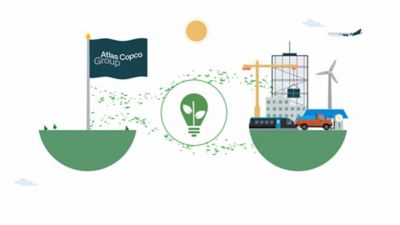This is how we do business
Atlas Copco Group is characterized by focused businesses in selected market segments, high customer focus through a decentralized organization, global presence, a stable service business, professional people, and an asset-light and flexible manufacturing setup. By providing professional service, technical competence, application knowledge, and digital capabilities, the Group builds close customer relationships through direct and indirect channels.
Vision, strategy and financial goals
Our vision is to become and remain First in Mind—First in Choice of our customers and other stakeholders. Our mission is to achieve sustainable, profitable, inclusive growth. This means that we should continuously deliver profitable growth with an increased positive impact on society and the environment and by promoting diversity and inclusion. Inclusion is about providing everyone within our organization with support and inspiration to learn and grow. It also means that we include the perspective of different stakeholders, like customers and society, when we create value.
- Revenue growth measured over a business cycle should be 8%.
- Sustained high return on capital employed by constantly striving for operational excellence and generating growth.
- Earnings as dividends to shareholders should be about 50%.
Structure and governance
Atlas Copco Group’s organization is based on the principle of decentralized responsibilities and authorities. The organization consists of both operating and legal units. Each operating unit has a business board reflecting the Group’s operational structure. The duty of the business board is to serve in an advisory and decision-making capacity concerning strategic and operative issues. It also ensures the implementation of controls and assessments. Each legal company has a legal board focusing on compliance and reflecting the legal structure of the Group.
The Board of Directors is responsible for the organization and management of the Group, regularly assessing the Group’s financial situation and financial, legal, social and environmental risks, and ensuring that the organization is designed for satisfactory control. The Board of Directors is also responsible for recruiting and appointing the President and CEO.
The President and CEO is responsible for the daily management of the Group following the Board’s guidelines and instructions. The President and CEO is also responsible for ensuring that the organization works towards achieving the targets for sustainable, profitable, inclusive growth. The President and CEO leads the Group Management, which also consists of the business area presidents and five functional heads. The business areas are responsible for developing their respective operations by implementing and following up on strategies and objectives to achieve sustainable, profitable, inclusive growth.
The divisions are separate operational units, responsible for delivering results in line with the strategies and objectives set by the business area. Each division has global responsibility for a specific product or service offering. A division can include one or more product companies (units responsible for product development, manufacturing and product marketing), distribution centers, and several customer centers (units responsible for customer contacts, sales and service) dedicated or shared with other divisions.
Regional holding functions are established worldwide to support the divisional structure of the Group and to represent Group Management.
Sales and service
The Atlas Copco Group’s ambition is to build close relationships with customers and help them increase their productivity and quality in a sustainable way. Customer engagement, sales, and service take place through direct and indirect channels (mainly distributors), online as well as offline, to maximize market presence. Digital capabilities and interaction are essential to support customers and create business opportunities. Consequently, we continuously develop our teams to ensure they are equipped in these areas with the right competencies to make it easy to do business with us. We always aim to be available when our customers need us, wherever we can support them best. The Group has a global reach with sales in more than 180 countries.
Equipment sales is performed by engineers with strong application knowledge and the ambition to offer the best solution for specific applications. Service and maintenance performed by skilled technicians are an integral part of our offering. Service is the responsibility of dedicated divisions in each business area. This includes the development of service products, sales and marketing, technical support, and service delivery, all supported by data analysis from connected equipment.
Manufacturing and logistics
We strive to have manufacturing close to our customers. As a result, our production facilities are located in Europe, Asia, and the Americas. Local manufacturing also brings resilience and the ability to adapt to changing conditions. Our philosophy is to manufacture in-house such components that are critical to the equipment’s performance. For other components, we leverage the capacity and competence of our business partners. Flexible purchasing and logistics are of great importance.
Approximately 75% of the production cost of equipment represents purchased components, and about 25% are internally manufactured core components, assembly costs, and overhead. Equipment sales generate about 65% of revenues, and manufacturing and logistics are organized to be able to adapt quickly to changes in demand. Equipment manufacturing is based primarily on customer orders, while only some standard, high-volume equipment is manufactured based on projected demand.
The assembly of equipment is generally carried out in the Group’s own facilities, and we take responsibility for the products’ functionality and quality. In order to optimize production flows, the assembly is typically lean, and the final product is generally shipped directly to the end user.The organization works continuously to efficiently use human, natural, and capital resources while ensuring the highest quality.
Innovation
At Atlas Copco Group we believe there is always a better way of doing things. By developing the right technologies, we will contribute to a better tomorrow. Hence, innovation and product development are of the greatest importance. Innovation will improve customer value and strengthen customer relationships, our brands, and financial performance. Products are designed internally, and research and development expenditures correspond to about 4% of total revenues.
The fundamental objective is to design and efficiently produce new or improved products that provide sustainable and tangible customer benefits in terms of productivity, energy efficiency, and/or lower life-cycle costs. New hardware and software are developed by skilled engineers in the divisions. Atlas Copco Group protects its technical innovations with patents. Innovation also includes improved processes to optimize the flow and utilization of assets and information. Overcapacities and inefficiencies must always be challenged.
Investments in fixed assets and working capital
Our manufacturing philosophy results in a moderate need for investments in property, plant and equipment, which can be adapted to short and medium-term changes in demand. Most investments relate to machining equipment for core manufacturing activities and to production facilities, primarily for core component manufacturing and assembly operations.
The working capital requirements are affected by the relatively high share of sales through own customer centers, which affects the amount of inventory and receivables. In an improving business climate with higher volumes, more working capital will be tied up. If the business climate deteriorates, working capital will be released.
Acquisitions
Acquisitions are primarily made in, or very close to, existing core businesses, with the aim to grow existing businesses or create new platforms for growth. All divisions are required to map and evaluate businesses that are adjacent, and may offer tangible synergies, to existing businesses. All acquired businesses are expected to contribute positively to economic value added.
Reporting
Financial statements are prepared in accordance with law and International Financial Reporting Standards. However, financial results are not the only measure of success, which is why Atlas Copco Group also integrates sustainability and social responsibility into its business reporting.
Culture, leadership and people
Atlas Copco Group’s culture is characterized by high-performing teams and a commitment to people, customers, products, and innovation. We believe that there is always a better way of doing things and advocate freedom with accountability. Several activities are carried out on a regular basis to maintain and develop our corporate culture, such as recurring workshops for employees on company values, strategy, and guidelines. In the Group, leadership is defined as the ability to create lasting results through people. The Group believes that competent and committed leaders are crucial to achieving sustainable, profitable, inclusive growth. Freedom to act and accountability are guiding principles.
All leaders are given a mission statement from their manager, outlining long-term expectations and goals in both quantitative and qualitative terms. The timeframe of the mission is typically three to five years. Based on the mission statement, the leader is expected to develop a vision,and clarify how the mission will be achieved, including the strategies, organization and people needed to make it happen.
Atlas Copco Group’s performance is closely related to how the Group succeeds in being a good employer, attracting and developing resourceful and motivated people. With a global business conducted through numerous companies, we work with continuous competence development, and knowledge sharing, while embedding our core values: interaction, commitment, and innovation, across all people processes. Atlas Copco Group has a strong culture of growing talent by encouraging employees to take accountability for their own career and competence development. The Group enables and encourages internal mobility and growth by offering continuous learning activities and an internal job market. With the ambition to develop individuals and teams to reach their full potential, Atlas Copco Group offers accessible tools and targeted learning content, both digital and classroom courses and programs, to all employees.
If the Group needs to adapt its capacity in a deteriorating business climate, the first action is to stop recruitment. Layoffs are the last resort.




